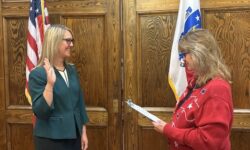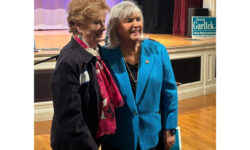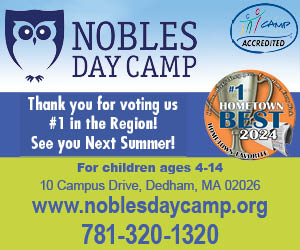By James Kinneen
Hometown Weekly Reporter
Now in its ninetieth year, the Needham Community Council runs a vast array of programs to serve the Needham community. Unfortunately, when COVID-19 forced so many outlets to drastically alter how they are run, the Needham County Council had to both adjust a wide variety of their existing programs, and create new ones to take care of the needs the pandemic has created.
A private non-profit that serves only Needham residents, programs the Community Council typically runs for Needham residents include the food bank, the lending of medical equipment, the Child Assault Prevention Program (CAP), a thrift shop, a transportation program, and large Thanksgiving and Christmas dinners.
Executive Director Sandra Robinson explained that when they examined their programs in light of the COVID-19 situation, the council's first priority was, far and away, the food bank. So in March, when other programs were shut down, the Needham Community Council did everything it could to keep the food bank going to deal with the large increase in people who needed their help.
“Our food pantry has definitely seen a significant increase,” Robinson explained. “We used to average around 200 active food pantry households, all that live in Needham, and right now we’re up to about 265. We get about one hundred more visits per month. People can come twice a month and we also have absolutely increased our deliveries as well. We used to do about fifteen deliveries a month, and now we’re doing about 20-25 deliveries a week.”
While it didn’t have anywhere near the number of volunteers it had before COVID, the food pantry made a contact list, moved to appointment-only, and began buying food in bulk rather than letting people shop for what they wanted. While that was more expensive, it was also far safer.
“Everything we’re doing is more expensive than it used to be,” Robinson noted. “Things like we’re not taking regular food donations from people right now - mainly because we don’t have the volunteers to sort it, organize it and check it - so we’re buying all our food in bulk. That’s easier when we’re doing our contact list, and our food pickup. Before, it was a system where people came and shopped, because we had things set up in categories as a store, but now we’re saying everyone’s getting this and that, so it’s more even in terms of what people are getting. People are able to have some choices so they could say, for example, ‘I don’t eat pork,’ or things like that, so they can make those choices. But that’s how that’s working.”
Unfortunately, at a time when every program the Community Council runs is more expensive, the entirely privately funded council lost one of its main income sources: its thrift shop, which provided about a third of the council's funding income, had to be shut down. In response, the council was able to adjust and make an outdoor tent-based thrift shop, where social distancing protocols could be maintained.
“We had a very active thrift shop that made up about one third of our income, but we shut that down in March and stopped taking clothing donations as well. We have now slowly started to open the donations by appointment, so people can get the appointments on our website. We had an outside tent sale going for the last three months, and we just took that tent down for the winter and we’re hoping to have an online shop for a while. The current plan is to have that open in January. But the tented thrift shop went so much better than I would have ever dreamed. There were lots of benefits to it. One was to let people know that we’re still here, still in business and still doing our work, and two was that people could come and shop safely outside because we had it set up so only so many people could shop at a time, and had our social distancing guidelines in place. It really worked and we did better financially on that than we would have ever dreamt was possible.”
Much like everything else in the COVID-19 era, many of the Needham Community Council's have programs moved to Zoom. For the first time in decades, the CAP program had to move out of the schools and into a virtual space; and because both the language program students and teachers felt uncomfortable learning in person, the Community Council’s language programs have only recently been able to transition to online learning.
Designed to teach children simple strategies to “reduce their vulnerability to verbal, physical and sexual assault,” the old CAP system involved volunteers going into classrooms and roleplaying various scenarios aimed at teaching kids who they can go to for help, and where they should bring their issues. Now, the system is more focused on teaching parents about issues that may arise with their children.
“With the CAP program, we are not in the schools right now at all. We are doing some things with the PTCs (parent teacher councils). We’re helping the parents sort of work with their children on children’s safety issues like online bullying and stuff like that. We’re working with the schools so that when things have normalized a little bit and schools aren’t in such a crisis mode, we’ll be able to get back in the schools - but that probably won’t be until next September. We were in the schools for about 25 years, so that was a big change.”
Change has been par for the course, as of late.
The language programs have transitioned to being virtual, after initially being shut down when tutors and students didn’t feel comfortable learning in person.
The council's transportation program had been volunteer based, but has had to move entirely to a ride-sharing app.
It's not all doom and gloom, though. The medical device lending program, for example, was not seriously affected by the pandemic. The council figured out a way to disinfect devices, so things like wheelchairs and walkers are still able to be lent out.
One of the more unfortunate, yet inescapable program losses was the annual Thanksgiving dinner. But although the annual dinner with the Rotary Club had to be cancelled, the group was still able to make sure people who both had nowhere to go on the holiday, nor food to eat, were taken care of.
“Thanksgiving dinner was a major pivot. We’ve always done two different aspects of Thanksgiving programming. One thing we’ve done is for people that utilize our food pantry to come and get ingredients to cook and prepare meals. So, we had a couple days where people would come in and get the ingredients to cook and prepare meals. Usually, we would have about 75 people over two days, but this year we had 160 people to get the ingredients. We were also able to give out gift certificates to a grocery store for people to get the ingredients we weren’t able to give them. That was for people who could cook for themselves. For many years, like 35 or 40, we have been doing a community Thanksgiving dinner on Thanksgiving Day with the Rotary Club. We’ve been doing it at the Masonic Hall. The Rotarians would do most of the cooking, and we would have people come to the hall for a sit down community dinner at noon, and would also do some deliveries. We’d have about 60 people that came to eat at the hall, and then we’d deliver meals to an additional sixty households. This year, we delivered 300 prepared meals to individuals on the day before Thanksgiving that they could reheat on Thanksgiving Day. So, we more than doubled our numbers, but it was very successful.”
The council used professional chefs, because they better understood how to cook safely during COVID-19 - something they plan to continue for the Christmas dinner.
Looking forward to the holiday season, the Needham Community Council has a few returning and newly-created programs for which they’re excited. Holiday Hearts is a gift card program designed to replace the toy drive they do every year. People will receive (via curbside pickup) gift cards in early December for them to buy gifts, so that people won’t need to drop off and pick up toys.
The also have a new program that seeks to help seniors learn to use tablets, in an attempt to both fight off isolation and allow them access to the programs they used to enjoy in person that have largely gone remote. Robinson noted the program has already gotten a 94-year-old woman access to her chair yoga - so while she’d like it to expand the program, it’s already been a success.
“We have a brand-new program we just put into place the last couple of months called ‘Tutors and Tablets’ [that] we’re doing in partnership with the Council on Aging. Basically, we’re getting tablets into seniors hands so they can do things like telehealth, Zoom calls, and participate in programming. We have tutors that are able to remotely help them, and the tutors have the exact same tablets we’re giving out, so they’re able to explain things to them. Right now, we have about 25 out in the community, and by January 1, we hope to be able to get another 50 out in the community."
Tutors start with a phone call until the seniors are capable enough to move to Zooming on the tablet, and the Needham Community Council is also able to help them get wi-fi if they don’t have it already.
While Robinson noted that the community has been great and supportive, the Needham Community Council is always looking for donations. To donate, and for more information about this vibrant organization, visit needhamcommunitycouncil.org.






















